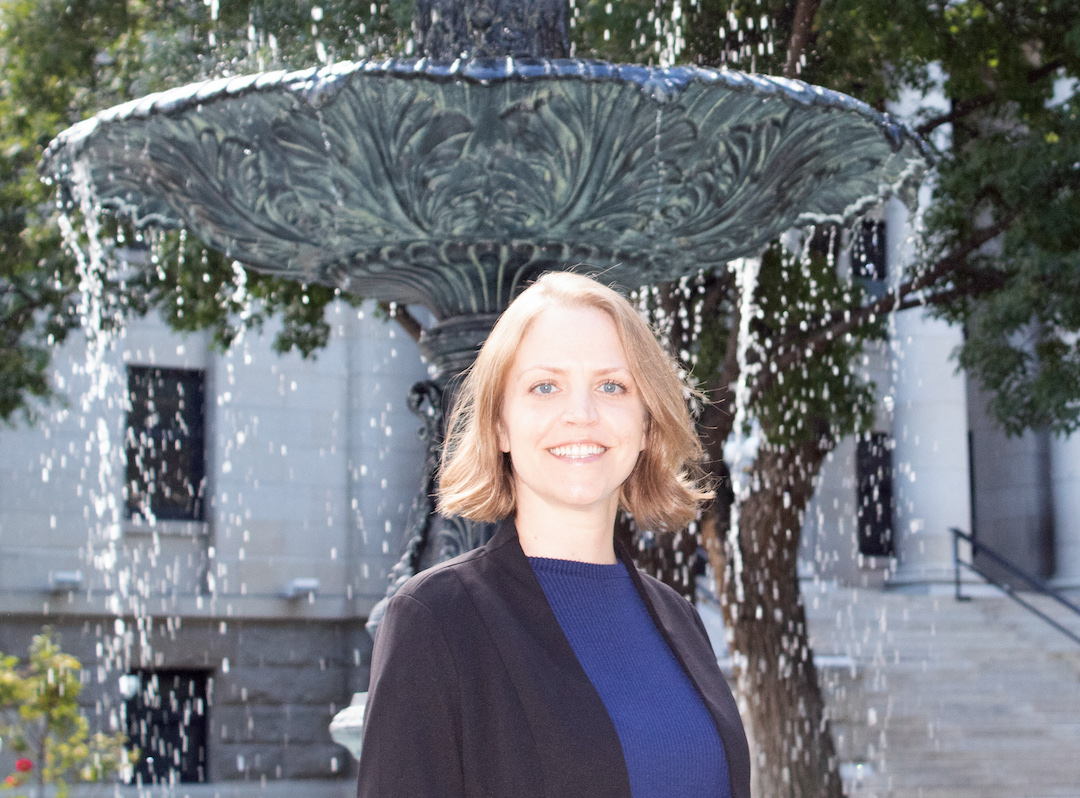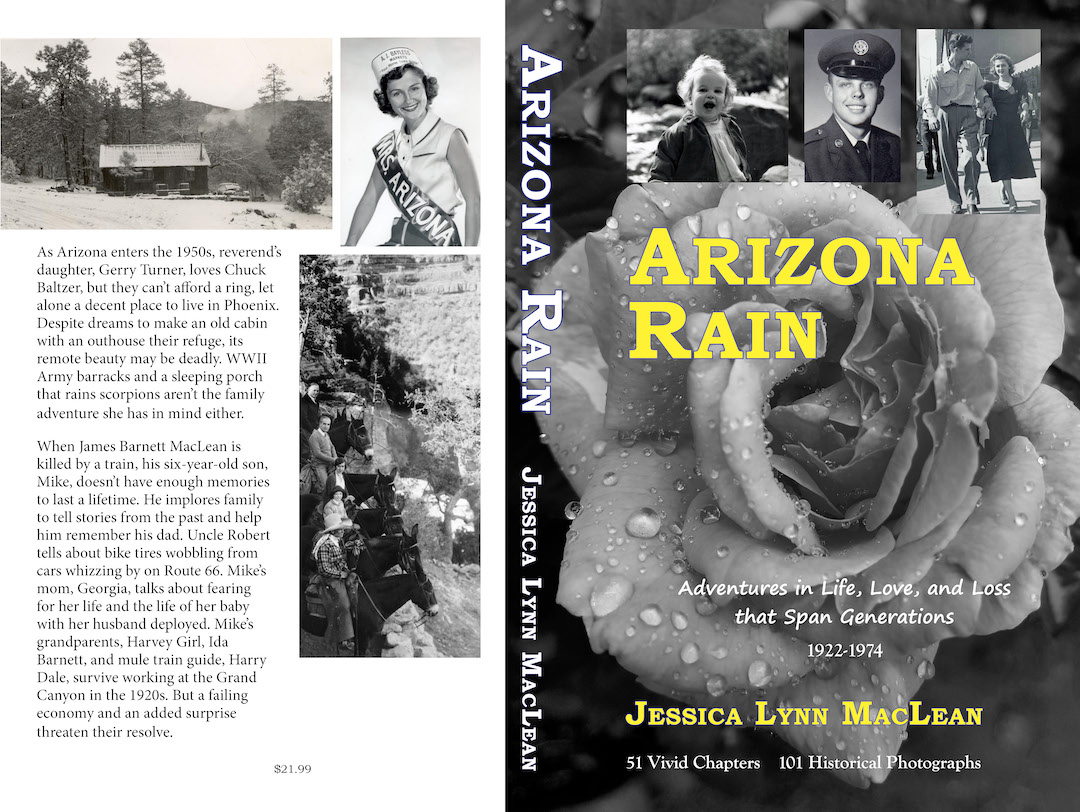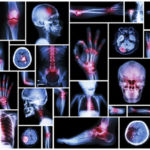For January’s Chronic Pain Partners post (our monthly newsletter), journalist Karina Sturm spoke with author and fellow EDS warrior, Jessica MacLean. Despite never being able to hold a pencil correctly, MacLean was first published during high school, and she became a writer. The Arizona native’s recently published book, Arizona Rain, tells the stories of her ancestors. With Sturm, MacLean speaks about her EDS journey, how writing saved her life, and shares the juicy details she found out about her family while writing her book.
[CW: Brief mention of suicidal thoughts.]
- Jessica MacLean
Karina Sturm:
Hi Jessica. I am so glad we managed to talk today. Can you tell me a little bit about when you were diagnosed with EDS and how the journey to finding answers was?
Jessica MacLean:
About 15 years ago, a physical therapist told me I was hypermobile. At the time, I didn’t really know what that meant. I knew I was flexible. But the word stuck with me. Years later, my sister-in-law’s sister started talking about Ehlers-Danlos Syndrome and hypermobility. And I thought, “I have that!” At the time, I had dozens of chronic conditions already and was like, “Well, do I really need yet another one? Excuse me for being so casual, but I live in Arizona.” [Laughs]
Sturm:
Oh, that’s totally fine with me. I’m German.
MacLean:
So I just dismissed it until years later, I kept seeing more and more signs of Ehlers-Danlos Syndrome. Then I tried to get answers from doctors but was constantly dismissed. Two primary care doctors completely ignored it and one rejected my request for further diagnostic testing. One said, “they can’t do anything about it anyway.” The rheumatologist had no clue of the indicators for EDS either. None of them were able to diagnose or help me. It was a battle. When I brought in the sheet with the diagnostic criteria for hypermobile Ehlers-Danlos syndrome to my primary care physician, he said, “Flexible skin? That could mean lots of things.” I said, “Yeah, I’m pretty sure that’s why they developed the diagnostic checklist you have in front of you.” A bit later, a fateful coincidence led me to meet a cardiologist at the courthouse square here in Prescott, Arizona.
His dog came up to me by the fountain. We started talking about yoga because I had a mat. And he looked at my hands, wrists, and head and told me I had Ehlers-Danlos Syndrome. He even knew my heart symptoms before I told him; it’s really amazing what a difference it makes when somebody understands EDS. It’s so validating. It’s an incredibly different experience for the psychological well-being of the patient.
Sturm:
You’ve been confirmed to have EDS very recently then, right? But you said you had many issues throughout your life. Were you diagnosed with other comorbid conditions before your EDS diagnosis?
MacLean:
My PCP will refer me to Phoenix for further genetic testing for EDS. But yes, I was diagnosed with many conditions throughout my life. I was born with spina bifida occulta. I had frequent ear infections as an infant, for instance. Growing up, I experienced frequent bronchitis. And I had my first migraine at seven years old. My kneecap was off track and I had Osgood Schlatter’s Syndrome, so I was in physical therapy when I was only 12. In my teens, I got an autoimmune condition, and it just kind of continued to grow. I also developed TMJ by age 20. And today, I have arthritis in my neck and knees. I also have spondylolisthesis and rare tarlov cysts in my low back that are filled with spinal fluid. Only three neurosurgeons in the U.S.–three out of 5,000–treat tarlov cysts. But they’re incurable. Moreover, I’ve been losing weight. I also have multiple chemical sensitivity, tinnitus, and allergies. The wildfires, forest service burns, and chemicals from neighboring construction projects make me sick and make me more and more sensitive to chemicals. Additionally, ever since I had COVID, my EDS completely changed. I obviously was affected by EDS my entire life, but COVID caused the pain and sensitivity to set in. Since then, my hands have been swelling, and my joints just pop out more frequently than before.
Sturm:
I can relate to that. Many of my symptoms have increased since my first COVID infection recently. Tell me a little bit about yourself. Who is Jessica without EDS?
MacLean:
I’m super adventurous, creative, and spunky. I also try to be kind too. I grew up doing a lot of activities: riding dirt bikes and horses, swimming, dancing, and playing basketball. I was the kid who did something for a season and then wanted to try something new. I could never hold a pencil correctly, but I still became a writer. I enjoy live music and going for a walk. Life has changed considerably. When I was healthier, I used to love fine wine, golf, and camping.
Sturm:
How did you get into writing?
MacLean:
When I was in fifth grade, I wrote a poem that won a contest. And in my senior year, my teacher gave me the English Award. He was supposed to pick a second student, but he didn’t just make a statement, which meant a lot to me. In college, I wrote a lot of literature reviews, and it just evolved from there. I went into marketing and communications and have continued writing throughout my career quite a bit. My first article was published in 2007.
|
Let Your Pain Fall People say that they’ll be there. |
Sturm:
So if you don’t write, what does your day look like?
MacLean:
In the morning, I walk with or without my dog. I apply for writing jobs, run errands, or do chores slowly. I try to enjoy the forest, and I go to the Prescott Western Heritage Center and listen to live music. I’m still adapting to the limitations as they come up. I connect with friends when I can, but that’s been a challenge. A lot of my oldest friends I am no longer in contact with, so I’ve tried to find new connections, because mentally, that’s so important.
Sturm:
How did EDS affect your writing career but also other parts of your life?
MacLean:
With my back issues and all the other conditions, it is challenging to leave my house for long or to do much. I cannot work a full-time job anymore. As a writer, it’s very hard because I have to limit the time I use my hands, but really other parts of my body too, like my neck, when it starts hurting. I sustained a brain injury years ago, and the EDS made it much more difficult to heal from. I often feel like a fragile egg.
Sturm:
I know you just recently published a book. Tell me how you got the idea for it, what it is about, and why you needed to write this particular book.
MacLean:
My mom passed away in 2020. At the same time, I had a brain injury and was really struggling. I moved and was incredibly down and feeling alone. I wasn’t able to go out and make new connections since it was the beginning of COVID. Then, I found a document that my grandma had written called “Chuck and Gerry: A Love Story.” It was about twelve pages long and what started this book. From there, I kept finding more documents from people–or pictures or newspaper articles. It felt like a literature review I would do in college. I would piece it all together, and it evolved. And it saved me. It felt like my ancestors were pulling me onto a life raft, and I was saved.
Sturm:
How so? Why do you feel like you have been saved? Or what did they save you from?
MacLean:
Well, suicidal thoughts are a real thing, right? Especially when you’re going through a great deal of pain. My mom was bedridden. She was miserable. She wasted away and died. Meanwhile, I was stuck in this medical world of doctors who would not even address the issue. It was a lot mentally. And then, on top of it, the physical pain, having a brain injury, being nauseous and tired every day. Of course, I was in therapy, but the one activity that kept me from going down a dark path was writing. It would distract me from those thoughts in a positive way and redirect them to create something that was meaningful.
- MacLean’s recently published book “Arizona Rain”
Sturm:
I very much relate to that because writing has always been my main coping mechanism, too. Even just writing in my diary about negative doctors appointments was always how I got rid of any anger and negative emotion. So I feel that. Tell me a bit about the book’s main story.
MacLean:
It’s quite a few stories on both sides of my family, from 1922 to 1974. Part one is my mom’s side of the family. My grandma was Mrs. Arizona circa 1954 and the daughter of a reverend who built churches. My grandparents fixed up old Army barracks and survived monsoons, raining scorpions, and the Big Snow. They built homes, cabins, and a beautiful life together while being trick water skiers. There were so many interesting elements I discovered. For instance, nine of my relatives worked at the Grand Canyon from 1902 to 1949. Railway employees, mule train guides, Harvey bus drivers, and Harvey Girls blazed trails. Part Two opens in 1962. My young dad learns that his father was struck and killed by a railcar. Readers see through his colorblind eyes. When older family members tell him stories from their past, the descriptions change to full-color vision. The whole discovery process and research were so much fun.
Sturm:
While you were researching, what was the most exciting or most surprising fact that you uncovered about anyone in your family?
MacLean:
I found out my great grandma was a Harvey girl at three locations! I thought that was so cool. Another exciting detail I found out was that my grandpa, when he was only 15 years old, went to the Grand Canyon by train all by himself and applied for a job. He then worked there for two summers. Learning all these new things about my family was the best part of writing the book.
Sturm:
Did you find anything shocking that you didn’t want to know about your family?
MacLean:
My grandma remarried shortly after my grandfather died. My step-grandfather was married before marrying my grandmother too. When they were both still married to their first spouses 70 years ago, my step-grandfather’s then-wife stayed with my grandparents for several days when she was in Phoenix for nursing training at a hospital. My grandparents lived in Phoenix at the time, but were from Winslow, a small town. So that was kind of juicy, right?
Sturm:
Did your research indicate that anyone in your family also had EDS?
MacLean:
I put quite a few health references in the story. My grandma mentioned that she had glandular fever. She also had a hard time recovering from surgery. I think she and my mom might have had a form of EDS.
Sturm:
Interesting. Where can people find and buy the book?
MacLean:
It’s available at Barnes and Noble right now, and also locally at the Prescott Western Heritage Center and a great bookstore, Peregrine Book Co., that I presented at recently.
Sturm:
And what do you hope to achieve with the book?
MacLean:
My mom always wanted me to write a book, so Arizona Rain is dedicated to her. The primary goal was to share and document stories to honor my family. But it also was to pull me out of that dark place I was in. Creativity is so wonderful for healing.
Sturm:
Anything you learned from your ancestors?
MacLean:
That beauty can come from anything and it’s important to meet adversity with strength, endurance, and courage.
Sturm:
That’s so true. Jessica, thanks so much for taking the time to share your story with us today. I appreciate it! I wish you all the best!
MacLean:
Thank you, Karina! I appreciate you. Talk to you soon.
Karina Sturm
January 2023




